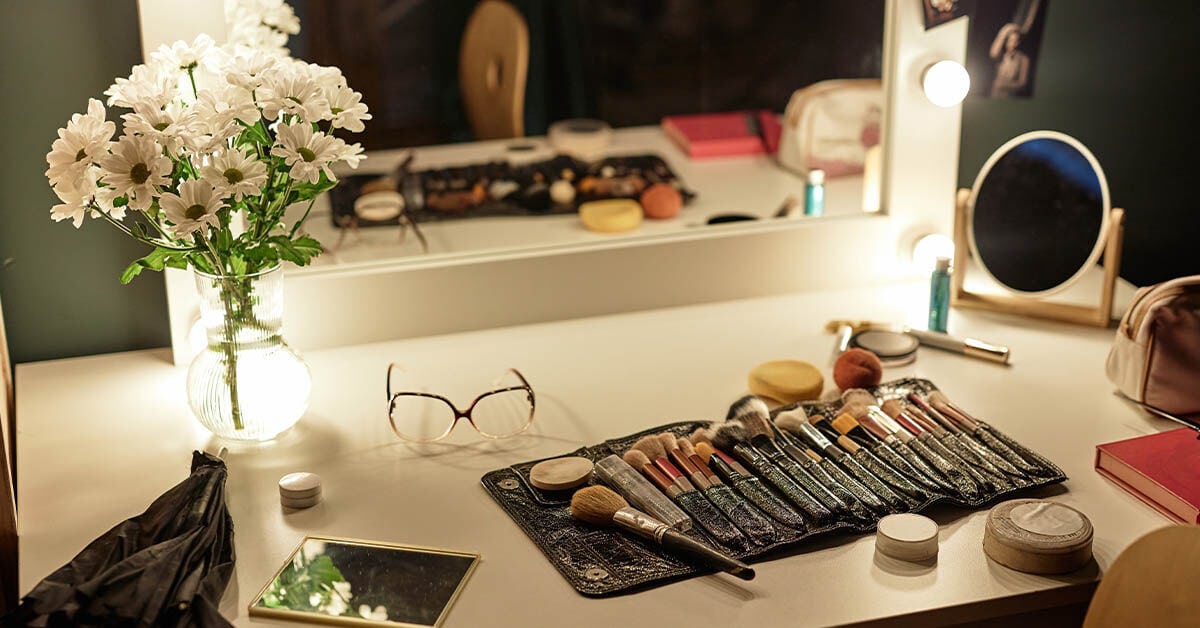
Playwright Peter Quilter has written dozens of hit plays. His work has been presented in major theatres in over 40 countries around the world and translated into more than 30 languages. His play End of the Rainbow, an unflinchingly honest but bitterly funny portrait of Judy Garland late in her career, was a Broadway and West End smash, earning three Tony Award and four Olivier Award nominations, including Best New Play. The stage play was adapted into the Oscar-winning film Judy, starring Renée Zellweger, in 2019, bringing Quilter’s work to an even larger audience.
Concord Theatricals proudly licenses Peter Quilter’s stage works, and we couldn’t help but notice that several of his plays explore similar themes: strong leading women in show business; age, grief and loss; and new beginnings. We caught up with Quilter to discuss four of his plays – End of the Rainbow (US), Curtain Up! (US/UK), Glorious! (US/UK) and The Actress (US/UK) – which, though very different, all address these themes with heart, vitality and humor.
All four of these plays deal with women and show business, yet each play is unique. What draws you to show biz as a theme?
Well, firstly, I am not from any kind of a theatrical background. I knew from an early age that I wanted a life in the theatre but I didn’t have a clue how any of it worked, onstage or backstage. So, the whole thing had a magical fascination for me, and I’ve carried that feeling with me and so enjoy writing about it. Also, from a dramatic point of view, the personalities of theatre people are often much larger, more eccentric, and so that gives you good material – especially for comedy.
You’ve written so many great plays with delicious roles for strong leading actresses. What’s the secret to writing a role that a terrific actress can really sink her teeth into?
Writing for women has been very deliberate. In 1993, around the time my writing career began, I went to see Sunset Boulevard (US) in London (starring Patti LuPone) and it occurred to me how rare it was to see a dominating female lead role in a show. I therefore set about finding a star vehicle for a woman and this play turned out to be Glorious! (the story of Florence Foster Jenkins, the untalented amateur soprano). Next, I wrote End of the Rainbow (about Judy Garland). Creating strong female roles was very satisfying, but also launched my career and enabled me to work with some incredible women around the world. The secret to writing it? Just identify or create a great character and when writing, ignore conventions and don’t hold back.
In their own way, each of these plays addresses aging, grief and/or loss (End of the Rainbow dramatizes Judy Garland’s late-career decline; Curtain Up! presents five women coping with a recent death; Glorious features a hilarious funeral, which I won’t spoil; and The Actress explores the emotional life an aging star at her final performance of The Cherry Orchard, another play about loss and farewells). Yet all are very funny. For you, what is the connection between grief and humor?
I want these plays to touch people, to have heart. And if you desire that in a comedy, or tragi-comedy, you need to introduce themes that people can respond to – love, relationships, death, heartbreak, failure, ambition, dreams, etc. Plus whatever theme I’m writing about, I always want to find the humor in it. I’ve never analyzed why I want to do that, but I do know that some of the richest and loudest laughs come from the combination of tragedy with comedy.
In The Actress, the title character says, “They don’t write parts for us. For us women. Once we reach a certain age… There are just a handful of roles and you have to wait for the call.” You have certainly written plenty of roles for women “of a certain age.” Is that why?
Yes, I think if you want writing to be your career, it makes sense to find gaps in the market. It’s such a tough profession, so hard to break through. So if I had found the world wanted plays for 50 people, then that’s exactly what I’d write. So when I realized there was a shortage of good plays for women, I put my focus on that. Not exclusively. But if I ever stumble upon an opportunity to give women the roles they deserve, then I jump at it.
After rereading all four plays, I found myself contemplating endings and new beginnings. Is this a theme you consciously pursue in your work?
I don’t consciously pursue anything. I write one page at a time, one line at a time. No structure, no plan, no themes. I just see where it takes me. But all the time, there are voices in your head hinting at what needs to happen, what would be a good ending, what the character should do, what remains unexplored. But I never over-think it. Often, the themes of the play emerge by accident or by osmosis. My aim is to entertain and to tell the story. If a theme of endings and beginnings emerges, then that’s fine, but it’s never planned or targeted.
Contents
End of the Rainbow (US)
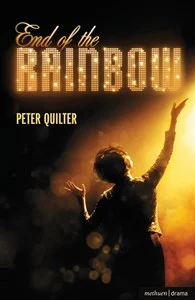 A savagely funny drama featuring a glorious collection of Judy Garland’s songs, infused with the glamour and the melancholy of stardom, this hit Broadway and West End play with music depicts the final years in the life of the superstar entertainer.
A savagely funny drama featuring a glorious collection of Judy Garland’s songs, infused with the glamour and the melancholy of stardom, this hit Broadway and West End play with music depicts the final years in the life of the superstar entertainer.
In this 2019 Breaking Character article, you wrote about the experience of translating End of the Rainbow to film. Shortly thereafter, Renée Zellweger won an Oscar for her performance in the film, and millions of people have since seen it. Yet the stage version remains viscerally powerful and successful. What is unique about the play as opposed to the film?
The film and play are two very different experiences. For a start, I didn’t write the screenplay for the movie, so it feels only half mine anyway. Plus the producers wanted to take the movie script in different directions and I think diluted the impact that the original stage show had (though it did win an Oscar, so they clearly got something right). But beyond this, seeing the show on stage is so much more exciting. The live performance of the songs, the power of the acting, the intense emotions and the big laughs. It really is a roller coaster – and you get everything: music, drama, comedy. It’s a full meal on stage.
The lead role in End of the Rainbow has been performed by so many different actresses around the world. What do they have in common? What does an actress need to make this show spectacular?
Firstly, it needs talent. You have to be a great actor and singer and (to a certain extent) a great impersonator. The show also requires huge energy and commitment. All the women who have excelled in the part – from New York to Chicago to Sydney to London to Rio de Janeiro and beyond – have been real firecrackers. Explosive energy, danger, high emotion. But also with sensitivity, emotion and a rich vein of humor. It’s a lot to ask, but, incredibly, wherever the show goes, we find someone who can knock the audience’s socks off.
Curtain Up! (US/UK)
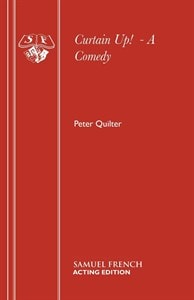 Based on Quilter’s earlier Respecting Your Piers, Curtain Up! is the hilarious story of five women who inherit equal shares in a dilapidated theatre and plan to bring it back to life. They try various fund-raising schemes, but their most ambitious is to hold a concert featuring local talent and a world-famous star who agrees to appear for no fee! However, their plans go awry and it’s a race to keep their audience from guessing the truth of the matter. A fast-paced and very funny comedy with five great roles for women.
Based on Quilter’s earlier Respecting Your Piers, Curtain Up! is the hilarious story of five women who inherit equal shares in a dilapidated theatre and plan to bring it back to life. They try various fund-raising schemes, but their most ambitious is to hold a concert featuring local talent and a world-famous star who agrees to appear for no fee! However, their plans go awry and it’s a race to keep their audience from guessing the truth of the matter. A fast-paced and very funny comedy with five great roles for women.
Unlike End of the Rainbow, in which one woman is surrounded by men, Curtain Up! explores female friendship and relationships among women of different ages. How did your experience working on this show, with an all-female cast, differ from that of your other plays?
I don’t see a difference. To me, it’s all about telling the story and whatever the balance is of men and women, I think the dynamic is the same – we just want to put on a good show. But I think all-female shows do have a different tone and there is a big audience out there who love a man-free evening!
This play is a love letter to live theatre, celebrating the joy of the performing arts. What has live theatre meant to you, and how have your experiences informed the play?
I think if you find something you love at an early age, you are very lucky. I didn’t really know what theatre even was until my mother unexpectedly took me to a matinee of Barnum (US/UK) when we got caught in a storm during a London day out. I was about 15 and got completely hooked. It’s just wonderful fun for me. I love going backstage, seeing the posters going up outside the theatre, all of that cliché stuff. So if theatre is in your blood, occasionally you feel you want to write a love letter to it.
Liza Minnelli plays a pivotal role in Curtain Up!, though we never see her onstage. When you wrote this play, did you know you’d someday write a whole show about Liza’s mother?
No idea at all! But it doesn’t have to be Liza anyway. I make clear in the preface that theatres can choose a different celebrity for the “guest” appearance. So the play might equally be graced by someone pretending to be Madonna or Elaine Paige or whoever.
Glorious! The True Story of Florence Foster Jenkins, the Worst Singer in the World (US/UK)
 In 1940s New York, the performer everyone wanted to see live was Florence Foster Jenkins, an enthusiastic soprano whose pitch was far from perfect. Known as “the first lady of the sliding scale,” she warbled and screeched her way through the evening to an audience who mostly fell about with laughter. But this delusional and joyously happy woman paid little attention to her critics; instead, she was surrounded by a circle of devoted friends who were almost as eccentric as she was. Based upon a true story, this uproarious and heart-warming comedy spins from Florence’s charity recitals and extravagant balls to her bizarre recording sessions and, ultimately, to her incredible triumph at Carnegie Hall.
In 1940s New York, the performer everyone wanted to see live was Florence Foster Jenkins, an enthusiastic soprano whose pitch was far from perfect. Known as “the first lady of the sliding scale,” she warbled and screeched her way through the evening to an audience who mostly fell about with laughter. But this delusional and joyously happy woman paid little attention to her critics; instead, she was surrounded by a circle of devoted friends who were almost as eccentric as she was. Based upon a true story, this uproarious and heart-warming comedy spins from Florence’s charity recitals and extravagant balls to her bizarre recording sessions and, ultimately, to her incredible triumph at Carnegie Hall.
This play is very, very funny – I kept laughing out loud while reading it. What inspired this unremitting silliness? Was it simply the subject matter?
It’s such a great subject. I heard one of Florence’s recordings by accident and then went into a music store in the West End to see if anybody knew anything about her. I knew I was on to a winner when I said “Florence Foster Jenkins?” to the staff at the English National Opera shop and everybody stopped what they were doing and smiled back at me. There was very little material available on her at that time – in fact I had to go to the Library of Congress in Washington to find anything at all. But I discovered enough about the characters and events to set up what I needed for the story to work – and then I let my imagination run riot. The play is 90% invention, but all the most unbelievable parts of the show are things that really happened. As always, there were lots of re-writes and changes during the process, but the story was already naturally funny and crazy, so you just had to refine it and make sure all the jokes landed.
Despite Florence’s appalling lack of talent, you manage to present her with dignity, and it’s clear you have great affection for her. How did you maintain that balance, allowing the audience to laugh at her situation without mocking her?
Yes, she was a terrible singer – but she was also an incredibly brave soul, a dreamer, a woman who defied her critics and did exactly what she wanted to do. So, I had no intention of simply mocking her. Perhaps a little at first, but as the other characters in the play fall in love with her spirit, so does the script and audience. You laugh with her, you adore her – and we all wish we could be that brave.
There is a consistent but subtle gay sensibility to this play. Do you think the play has particular resonance for gay audiences?
Well, I do think Florence is very camp! I mean, there she is at Carnegie Hall destroying Mozart in flapping Angel wings and a halo. So I think gay audiences can take this delicious story to a whole new level. Plus as a gay writer myself, I do feel I can push the envelope a bit. So there’s plenty of knowing gay humor in the show, which the audience recognizes and embraces.
Glorious! has a delightful sense of whimsy, playfully presenting characters accepting one another’s quirks and idiosyncrasies. Do you think it’s one reason for the play’s immense success?
I do think the play aims to have a kind of 1940s charm about it. It is innocent in many ways, light, funny and deliberately old-fashioned. There are very few contemporary plays that have this feeling and I think it’s success is directly down to that in many ways. The eccentric characters, the naivety, the silliness. It’s hard to find new plays that aren’t dark, political or cynical. Glorious! takes the opposite path and embraces lightness and joy. And that rarity meant there was a big audience waiting for it.
The Actress (US/UK)
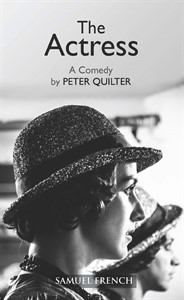 The Actress dramatizes the events backstage as a colorful, complicated actress makes her emotional farewell performance. Various people from her life invade her dressing room to say their goodbyes, declare their love, roar with laughter, spit insults, grab a final embrace and renew old battles.
The Actress dramatizes the events backstage as a colorful, complicated actress makes her emotional farewell performance. Various people from her life invade her dressing room to say their goodbyes, declare their love, roar with laughter, spit insults, grab a final embrace and renew old battles.
Lydia, the title character of the play, is the polar opposite of Florence in Glorious! – she’s jaded, self-aware and apprehensive (but still vain). Still, audiences like her and we’re rooting for her. What inspired you to create her?
The character was inspired by a particular actress (or female actor) that I worked with many years ago. I went into her dressing room one day and she screamed at me for 5 minutes for no particular reason. Then later that day I saw her walking home, alone, deflated and in tears – a completely different person to the diva that confronted me earlier. I sent her a note to apologize for whatever it is I might have done, even though I hadn’t done anything at all. She replied to thank me for my kindness and from that day on became like a mother figure to me in the production. But the drama in her life and backstage was ridiculous and very hard to keep up with. Yet, she had such charisma. I thought to myself that one day I must put this woman down on paper – and eventually I did.
You say in the notes that the play can be set in any era (“modern day, or in the 1930s, 1950s, 1980s, etc.”) Have you seen productions set in various time periods?
Yes, the show has had beautiful Victorian era productions and others set near to our own time. Apart from the visuals, it makes little difference. The life of an actor, at its heart, remains the same now as it did a hundred years ago.
I’m doing what I love. What could be nicer?
In The Actress, Paul says to Lydia, “You can run away from the theatre, but it’ll get a map and hunt you down.” Is this true of Peter Quilter as well?
It’s my career, my hobby and, I suppose, my obsession. I still get a feeling of excitement when a new production is announced – whether it’s a 1,000-seater on Broadway or a 100-seater in a cellar in Prague. I love having plays on and being involved in that world. Hearing an audience laugh is an incredible reward for your hard work. At the end of the day, I’m doing what I love. What could be nicer?
What do you hope audiences will take away from seeing your plays?
Foremostly, I’m an entertainer. I want audiences to have a great time, whether it’s a drama or a comedy. They’ve given up their evening and it’s my job to take them out of their own lives for a few hours and then feel by the time the curtain comes down that it was well worth the time and expense. I hope the plays will touch people, warm their hearts and make them think. But most of all I want them to be entertained – to laugh and cry and cheer.
What advice would you give to theatre makers planning to produce any of the plays we’ve discussed today?
None of the shows are expensive or over-complicated to stage. My work is produced in 40 countries and so has to adapt to stages of different sizes and also often to companies with limited resources. So I always ensure there are no production headaches facing you. Beyond that, just cast the parts well and enjoy the experience. We’re lucky to be doing this.
For more information about licensing these and other plays by Peter Quilter, or to purchase one of his scripts, visit Concord Theatricals in the US or UK.
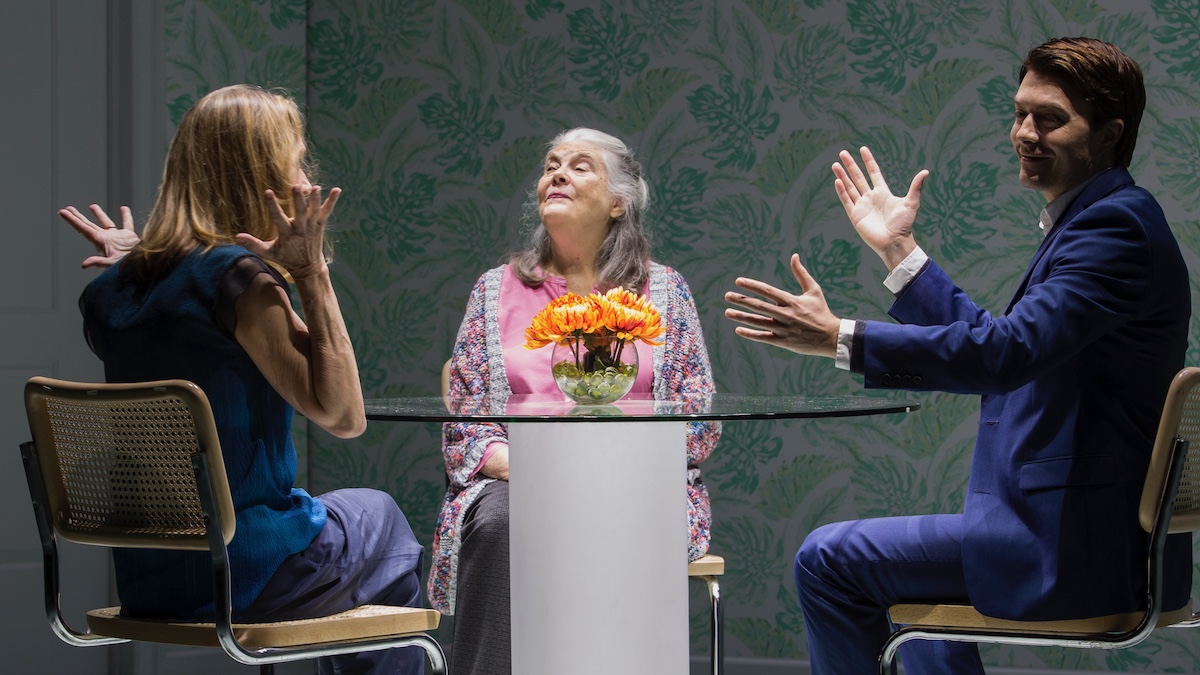
Plays About Technology

Newly Available for Licensing – December 2025 (US)

